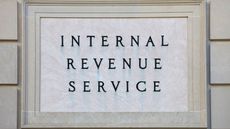Still Awaiting Your Federal Tax Refund? You're Not Alone
The IRS has a backlog of millions of unprocessed tax returns. If one of them is yours and you're owed a tax refund, you want to know when the IRS will send you your money.
- (opens in new tab)
- (opens in new tab)
- (opens in new tab)
- Newsletter sign up Newsletter


Service may be part of the IRS's official name, but the tax agency has been lacking in this area, especially over the past couple of years. It's not all the IRS's fault. Credit the perfect storm of the COVID-19 pandemic, lots of stimulus-related tax law changes passed by Congress for the IRS to administer, years of budget cuts, and a shrunken workforce. All of these, plus other factors, has helped lead to the IRS's backlog of millions of unprocessed returns and delayed tax refund payments.
The good news is that the IRS has made progress on its processing of returns, in part because it went on a hiring spree and shifted current personnel from other areas to assist with the backlog. Agency statistics from 2021 and 2022 demonstrate the forward movement made by the IRS. As of June 25, 2021, there were 16.7 million 2019 and 2020 1040 forms that still required manual processing. As of this summer, the IRS finished processing all individual returns it received in 2021 that had no errors, including 2020 e-filed and paper forms.
The bad news is that the IRS still has a backlog of millions of unprocessed 2021 returns that were filed this year, the vast majority of which are paper-filed returns. As of July 29, it had 10.2 million unprocessed 2021 individual returns. Of these, 1.8 million returns require special handling, such as error correction, and 8.4 million are paper 1040s waiting to be processed and reviewed. And there are very, very long waits for tax refunds. Refunds on paper-filed returns, which the IRS usually pays to filers within six to eight weeks in normal years, are taking four months or longer to be paid. The IRS says it will get through its backlog of unprocessed returns by year-end, but this isn't much relief to people who are still awaiting tax refunds on their 2021 returns that they filed months ago.

Sign up for Kiplinger’s Free E-Newsletters
Profit and prosper with the best of expert advice on investing, taxes, retirement, personal finance and more - straight to your e-mail.
Profit and prosper with the best of expert advice - straight to your e-mail.
So, what steps can you take if you filed a return earlier this year and are still waiting for your refund? You can check the IRS's "Where's My Refund" tool on its website (opens in new tab). Unfortunately, this tool provides limited information to filers seeking the status of their tax refunds. It will only let you know whether the IRS received the return and if it's still being processed, whether a refund was approved, and when it was sent. It doesn't say whether return processing has been suspended because of a math error or for another reason. The IRS continues to direct Form 1040 filers who are awaiting delayed tax refunds to the Where's My Refund tool for status updates. And filers dutifully check the tool for months on end, but this is obviously frustrating for people who see only a notice that the return is received or in process, but nothing on the status of their tax refunds.
You can try to call the IRS to check on your refund, but there is no guarantee that you'll even get through to a live person on its toll-free phone line. Even if you do get through, the operator may not be able to give you any more information other than what you can see for yourself on the Where's My Refund portal. You might have better luck calling if it's been at least six months since you filed your 2021 paper return.
If you've contacted the IRS about your delayed refund with no results, and not having the money is causing you a financial hardship, you can try calling the IRS's Taxpayer Advocate Service (opens in new tab). Unfortunately, TAS can't assist with delayed refunds in most situations, but this is an instance in which it can still be of help.
Another suggestion is to contact your congressional representative. This might sound like a long shot, but we've heard from some people who had success doing this. Much of it depends on how helpful and knowledgeable the congressional aide answering the phone is on this topic. If your representative happens to sit on the House Ways & Means Committee (opens in new tab), that's a plus.
A couple of things you should not do: Don't write to the IRS regarding your late tax refund. The IRS is already behind on opening and answering paper correspondence, and your letter will just fall to the bottom of the pile. Also, don't file a second return or an amended return for 2021. This will only confuse the IRS and delay your refund even longer.

Joy is an experienced CPA and tax attorney with an L.L.M. in Taxation from New York University School of Law. After many years working for big law and accounting firms, Joy saw the light and now puts her education, legal experience and in-depth knowledge of federal tax law to use writing for Kiplinger. She writes and edits The Kiplinger Tax Letter and contributes federal tax and retirement stories to kiplinger.com and Kiplinger’s Retirement Report. Her articles have been picked up by the Washington Post and other media outlets. Joy has also appeared as a tax expert in newspapers, on television and on radio discussing federal tax developments.
-
-
 Longevity: The Retirement Problem No One Is Discussing
Longevity: The Retirement Problem No One Is DiscussingMany people saving for retirement fail to take into account how living longer will affect how much they’ll need once they stop working. What should they do?
By Brian Skrobonja, Chartered Financial Consultant (ChFC®) • Published
-
 Capital Gains Taxes Trap: How to Avoid Mutual Fund Tax Bombs
Capital Gains Taxes Trap: How to Avoid Mutual Fund Tax BombsIt’s bad enough when your mutual fund’s assets lose value, but owing unexpected capital gains taxes after those losses is doubly frustrating.
By Samuel V. Gaeta, CFP® • Published
-
 How to Lower Your Tax Bill Next Year
How to Lower Your Tax Bill Next YearKnowing how to lower your tax bill (pay less taxes) when it's time to file your return next year requires some strategizing through the rest of 2023. Here are some tax tips to help make it happen.
By Katelyn Washington • Published
-
 Indiana Storm Victims Have an Extended IRS Tax Deadline
Indiana Storm Victims Have an Extended IRS Tax DeadlineIndiana taxpayers impacted by recent severe storms have an extension of the April 18 deadline to file federal tax returns.
By Katelyn Washington • Published
-
 IRS Says File Soon for $1.5 Billion in Unclaimed Tax Refunds
IRS Says File Soon for $1.5 Billion in Unclaimed Tax RefundsUnclaimed tax refunds from 2019 are waiting for millions of people who might not know it – but only if they file the pandemic-era tax return soon. Are you one of them?
By Kelley R. Taylor • Published
-
 Tax Tips for Last-Minute Filers
Tax Tips for Last-Minute FilersTime has run out for most people to file taxes for 2022, but these tax tips could help you file soon after the tax deadline and possibly keep more money in your pocket at the same time.
By Katelyn Washington • Published
-
 How to Pay the IRS if You Owe Taxes
How to Pay the IRS if You Owe TaxesThere are several ways to pay the IRS if you owe taxes, but just because you can pay your tax bill over time doesn’t always mean you should.
By Katelyn Washington • Published
-
 Who is Required to File a Tax Return, and Who Isn't
Who is Required to File a Tax Return, and Who Isn'tIf you meet certain income requirements, you are required to file a federal tax return (or get an extension) by Tax Day. You could face penalties if you don't.
By Katelyn Washington • Published
-
 California Tax Deadline Extension: What You Need to Know
California Tax Deadline Extension: What You Need to KnowSome Californians have more time to file federal and state tax returns because of natural disasters.
By Kelley R. Taylor • Published
-
 IRS Says Some Stimulus Check Recipients Should File an Amended Tax Return
IRS Says Some Stimulus Check Recipients Should File an Amended Tax ReturnSome early filers who received state "stimulus" payments may need to file an amended tax return to possibly get a refund.
By Kelley R. Taylor • Last updated









